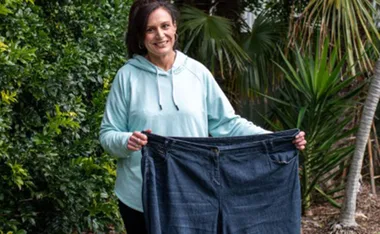Sitting by the heater with a mug of hot chocolate or a glass of red sounds so much more inviting than running through puddles or shivering as you cycle.
But ditching your workout in favour of extra kilojoules is the perfect recipe for unwanted weight gain during the colder months.
Caitlin Reid, dietitian and exercise physiologist from Health & the City, gives her top ten tips for beating the bulge this winter.
1. Eat more protein
Protein helps to keep you feeling satisfied for longer, reducing the likelihood of overeating. Protein-rich foods such as lean red meat provide critical nutrients, like iron that may be lacking in your diet. Being low in iron can make you feel tried, unwell and lacking in motivation to exercise and eat healthy. Spread your protein intake out evenly throughout the day and include a source of protein such as meat, fish, legumes, dairy foods or nuts at every meal.
2. Take control of your environment
According to US researcher Brian Wansink, hidden persuaders around us make us overeat without realising. Here’s how to manage your surroundings:
Limit your access to fattening foods: Don’t keep high-kilojoule comfort foods, like biscuits and chocolate, in the house.
Eliminate distractions: Turn off the TV or radio while eating so your body realizes when it has had enough.
Downsize your crockery: Eating off smaller bowls and plates really will help you eat less.
Listen to yourself: Are you eating because you’re really hungry, or because you’re tried or stressed?
3. Eat slowly
When you walk through the door starving after a long day at work, it can be difficult not to bolt down whatever food is put in front of us. Instead, take time with your meal. Sit at the table, not on the couch in front of the TV, and chew slowly. Why? Because it takes about 20 minutes for your brain to register you’re full. Eat too quickly and it’s likely you’ll get eat more than you need. Taking the time to enjoy the eating experience — the taste and texture — also helps promotes a sense of satisfaction for the entire meal.
4. Keep moving
Exercise not only keeps you warm, it also helps you burn off the kilojoules you take in. The ability of exercise to maintain your weight should not be underestimated, but for the best benefits you need to be consistent with your training. Aim for at least one hour of moderate intensity exercise at least five times per week and your waistline will thank you.
5. Limit the comfort food
When it’s miserable outside, we want the foods that warm us up and comfort us. Creamy pasta dishes may taste great, but eating these rich foods each night makes it hard to maintain weight during winter, particularly if you don’t control the portion sizes. Limit the comfort food to every other week and enjoy hot soups or steamed vegetables and lean meats most nights for dinner.
6. Weigh in regularly
Tracksuits and ugg boots are a cosy way of getting through winter, but it’s easy for those extra couple of kilos to creep on without you realising. Keep your weight in check by weighing yourself at the same time on the same day each week. Don’t have scales? Wear your skinny jeans or a tight dress or skirt to keep your weight in check.
7. Drink herbal tea between meals
Virtually kilojoule-free (that’s when it’s drunk on its own without milk or sugar), tea is the perfect way to keep you warm and satisfied this winter. Instead of choosing kilojoule-laden hot chocolates, enjoy an old-fashioned cuppa.
8. Warm-up with soup
Soup not only provides warmth during the colder months, it’s also fantastic for keeping your waistline in check. Soup is low in kilojoule density, which means it contains fewer kilojoules for a given weight of food. Research shows that people tend to eat the same volume of food, which means when we choose soup, we feel fuller on fewer kilojoules. A low-kilojoule soup (stay clear of the creamy soups and laksas) is perfect for warding off winter weight woes.
9. Sit to eat
Sit down at the table every time you eat — no eating at your desk, in your car or on the train, walking from the kitchen or on the sofa. Treat every meal and snack with respect and you’ll be less likely to use your fork (or hand) as a shovel. Mindful eating is the smart way to eat.
10. Don’t share food
Communal food plates consumed when dining out with friends mean more food is eaten, say researchers from the State University of New York at Buffalo. People often eat to match the intake of the people they are eating with. If you’re out with a friend who is a big eater, it means too much food for you. Instead of sitting at home alone though, select your own dish off the menu and stop eating when you feel satisfied.











